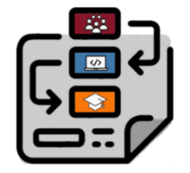Algorithm Picture Lesson
(View Complete Item Description)The goal of this activity is to build critical thinking skills and excitement for Computer Science / Computational Thinking, while laying a foundation of fundamental programming concepts. By scaffolding basic concepts like sequencing and algorithms in an unplugged activity, students who are intimidated by computers can still build a foundation of understanding. In this lesson, students will learn how to develop an algorithm and encode it into a program.By "programming" one another to draw pictures, students experience some of the core concepts of programming in a fun and accessible way. The class will start by having students view a video of a simple program demonstrating how to develop instructions for building a peanut butter and jelly sandwich. Students will start with simple shapes, and progress to the coding of a specific drawing that other students will then try to replicate (“running the program”). If there is a desire to have a more of a Math slant on the lesson, the drawing could take place on graph paper. Students would then use the coordinates to complete the drawing.
Material Type: Activity/Lab, Lesson, Lesson Plan, Visual Media




















